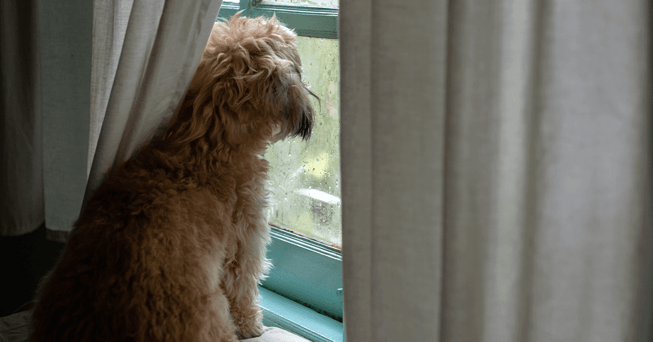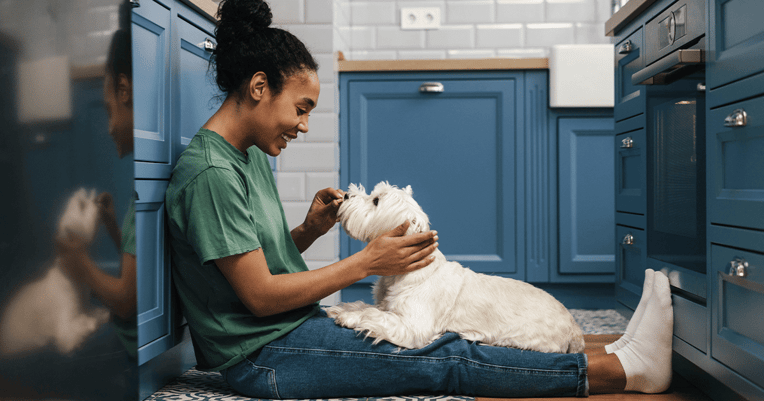It’s well known that dogs perceive the world different to us humans and can find certain loud noises especially scary. Sometimes it’s a storm, a fireworks display, or sometimes even just the rumble of traffic. Whatever the cause, it’s often enough to make our four-legged friends whine or tremble in fear. When this happens, it’s only natural for us to want to help them.
Why Are Dogs Scared Of Thunder?
Generally speaking, dogs that are scared of thunder tend to be scared of other loud noises, too. A key to understanding this is likely down to their sensitive hearing. Dogs can hear significantly lower frequencies than humans, meaning they may hear the low rumbles of approaching thunder well before humans do.
This isn’t necessarily a bad thing in its own right. In the wild, being scared of thunder could be considered a beneficial survival skill. After all, storms can mean falling trees, flooding, and lightning strikes. Dogs can also detect the barometric changes that storms bring, as well as notice the increased wind and rain, and so may become restless or seek out a place of shelter where they feel safe.
That said, it could also be the association of bright flashes of light that can make dogs scared of thunder. Storms are dangerous and unpredictable, and there could be any number of causes behind noise phobia in dogs. The reason why one dog may be scared could be entirely different from another, just as each dog’s experience of it in the past will have a different effect too.

How To RecogniZe Dog Thunderstorm Anxiety
There are a few distinctive clues you can look out for if you are concerned your dogs are scared of thunder. These include:
- restlessness and pacing
- panting
- drooling
- barking and whining
- shaking and trembling
- yawning
- having their tail between their legs
- trying to hide or get to somewhere they feel safe
- urinating or defaecating
If your dog is displaying any combination of these signs during a storm, it could mean they have dog thunderstorm anxiety. Still, it is possible to help them. Continue reading for advice on caring for dogs scared of thunder.

How To Calm A Dog During A Storm
For dogs with noise anxiety, we recommend following these tips during a thunderstorm:
- Make sure your dog has access to a place they feel safe in – If you’ve noticed your dog retreating to the same spot during previous storms, you can make this spot more comfortable with familiar bedding or a crate. You could even cover the crate with a blanket to make it more like a den and muffle out the sound and flashes. However, try not to disturb your dog once they’re already in there.
- If your dog wants to pace, let them do this – It’s important dogs with thunderstorm anxiety are able to expend any nervous energy, while pacing doesn’t pose any risk.
- Put on background noise – Putting on classical music or the TV can reduce the impact of thunder. This should be at a volume your dog is already used to.
- Offer chew or puzzle toys – These can be a good distraction for dogs scared of thunder.
- Close the curtains – This will block the bright flashes caused by lightning.
- Keep calm - Dogs with thunderstorm anxiety are likely to become more agitated if they’re in an environment in which others are also anxious. Instead, demonstrate through your own behaviour that storms do not need to be feared.
- Don’t scold or punish your dog for showing signs of dog noise anxiety – This can make the situation worse for them and could also potentially affect your bond. It’s important to be a source of comfort for your dog if they seek your reassurance.
- Prepare for future thunderstorms – You can try also introducing sound recordings of storms – just make sure this is at a time when no storms are expected. Start at a very low level and slowly build up the volume, making sure your dog remains calm at each one. Consider combining this with ThunderShirt’s calming coat for dogs and reward them for showing relaxed behaviour throughout. This training won’t replicate the barometric changes of a storm fully but could help with your dog’s anxiety. It can be a particularly good idea to do this for puppies during their socialization period.
If your dog needs additional support, we’d recommend speaking to your vet. A qualified vet can prescribe anti-anxiety medication and can check for any underlying medical issues that are also affecting your dog. They can also refer you to a certified behaviourist for an individual management plan to help your dog cope better.
For more information get in touch! We’d love to hear more about your situation and discuss what we can do to help! You can also stay informed with our latest informational guides, Q&As, and tips and advice by signing up to our newsletter.

